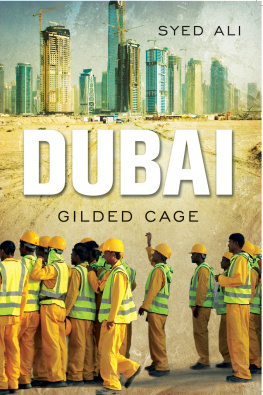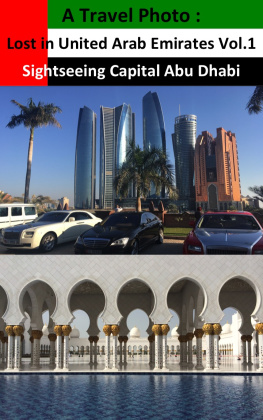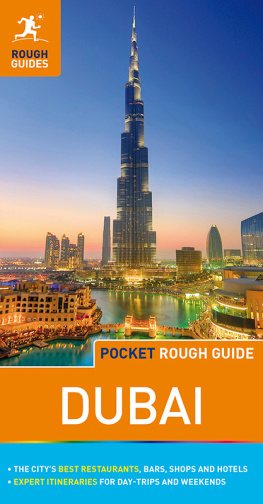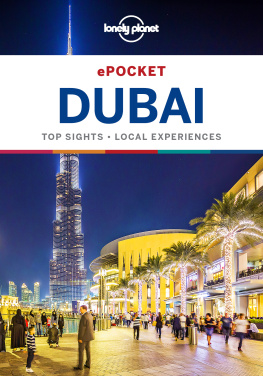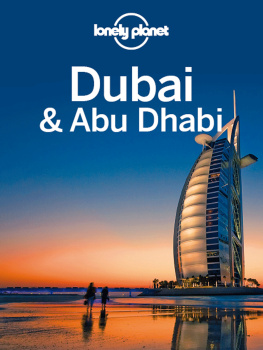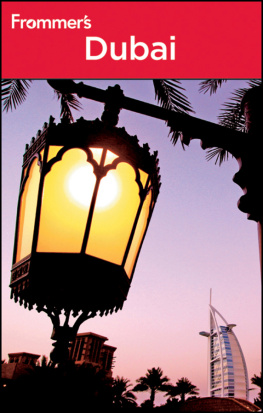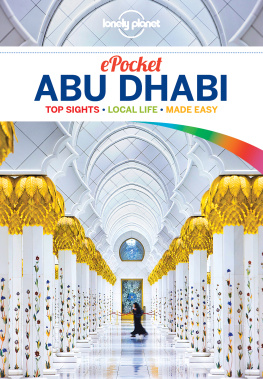DUBAI
GILDED CAGE
SYED ALI
YALE UNIVERSITY PRESS
NEW HAVEN AND LONDON
Copyright 2010 Syed Ali
The right of Syed Ali to be identified as author of this work has been asserted by him in accordance with the Copyright, Designs and Patents Act 1988.
All rights reserved. This book may not be reproduced in whole or in part, in any form (beyond that copying permitted by Sections 107 and 108 of the U.S. Copyright Law and except by reviewers for the public press) without written permission from the publishers.
For information about this and other Yale University Press publications, please contact:
U.S. Office: sales.press@yale.edu yalebooks.com
Europe Office: sales@yaleup.co.uk www.yaleup.co.uk
Set in Janson Text by IDSUK (DataConnection) Ltd
Printed in Great Britain by Hobbs
Map by Martin Brown Design
Library of Congress Cataloging-in-Publication Data
Ali, Syed.
Dubai : gilded cage / Syed Ali.
p. cm.
ISBN 978-0-300-15217-3 (cl : alk. paper) 1. Dubayy (United Arab Emirates : Emirate)History. 2. Dubayy (United Arab Emirates : Emirate)Economic conditions. 3. Dubayy (United Arab Emirates : Emirate)Politics and government. 4. Foreign workersLegal status, laws, etc.United Arab EmiratesDubayy (Emirate) 5. United Arab EmiratesEmigration and immigrationEconomic aspects. I. Title.
DS247.D78A44 2010
953.57dc22
2009044743
A catalogue record for this book is available from the British Library.
10 9 8 7 6 5 4 3 2 1
2014 2013 2012 2011 2010
CONTENTS
For Eli, Sami and Noura
PREFACE
I N FEBRUARY 2009, the New York Times published a front page article titled, Laid-off foreigners flee as Dubai spirals down. One eye-opening assertion the article reported was that three thousand cars had been abandoned at Dubai International Airport, some with maxed-out credit cards inside and notes of apology taped to the windshield. The author of the piece asserted that, due to the economic crash, parts of Dubai, once hailed as the economic superpower of the Middle East, were looking more and more like a ghost town.
This article, more so than similar articles being published in the local press at the time, sent government officials into a tizzy. They lambasted the critical press coverage, and denied that the economy was in a downward spiral. Or that three thousand cars had been abandoned their official count was eleven. Officials said that more work permits were being issued than were being cancelled, implying the population was actually continuing to grow, and that talk of Dubais demise was simply false, rumours spread by those jealous of Dubais success.
While Dubais phenomenal growth in the past decade led many in Dubai to believe that its meteoric rise would somehow not be subject to economic laws of gravity, the naysayers who think that Dubai is simply a house of cards are equally wrong. Dubai is not a mirage, and it is unlikely that it will revert to the sleepy regional city it was before the boom. In the pages ahead then, I will not be addressing the downturn as a central story line, though I feel it is important that I do at the least acknowledge it. What the book is about, as you will see, is the various factors that account for Dubais rise to international prominence, and their unforeseen effects, and the ways that Dubais system of temporary visas for foreigners shapes living and working conditions for foreigners and citizens both.
WHY I WROTE THIS BOOK
I initially came to Dubai to do research on the adult second-generation children of expatriate, foreign, workers. Expatriates account for more than 90 per cent of Dubais population, and live there in a state of permanent impermanence. That is to say, no matter how long they have lived and worked in Dubai, they cannot get permanent residency (like a US green card), and it is exceedingly difficult to become a naturalized citizen. Their children, even if they are born in Dubai, are citizens of their fathers (or sometimes mothers) country of passport, even if they themselves have never been there. They always remain foreigners in their homes both in their countries of passport and the place where they actually live.
These second-generation expatriates who I encountered were all by definition at least middle class, as there is a minimum income requirement for expatriates to bring their family members, and most were living quite well. I was interested in what to me was an odd situation where a huge group of people can grow up in a place they cannot legally call their own. My intention was that the book was to revolve around their experiences. It was to be the story of a privileged class of people who were legally invisible and permanently temporary, but who for the most part had no real problem with that as generally they were leading the good life.
At this point I should note that Dubai is ruled by a benign autocrat, Sheikh Mohammed bin Rashid Al Maktoum, who fashions himself more as a CEO than a king. While he is often described glowingly as the CEO Sheikh in the press, the fact remains that Dubai is a kingdom where essentially the law is what this sheikh says it is. It is not a free society. But visitors and even residents in Dubai can be forgiven for missing this fact since Dubai advertises itself as an open place, and the usual trappings of a control-obsessed dictatorship are missing here. While I was in Dubai I went about my daily routine of interviewing people and asking wide-ranging questions, writing a blog with no attempt to mask my identity, and generally going about as if no one were paying attention.
) In a place like Syria or Iran there is a good chance that I would have ended up in jail for an unpleasant extended stay. But Dubai is different. People want desperately to be in Dubai for the opportunities it offers, so the worst thing Dubai can really do is make them leave. Among dictatorships and democracies, this makes Dubai different.
Interestingly, many people, Emirati national citizens as well as expatriates, do not have a problem with this kind of Big Brother treatment. Indeed, many welcome it. Some of the responses to my experience posted on my blog blamed me for the trouble I got into, and basically said that it was good the government kept a close eye on things. This made me rethink the idea of Dubai as a freewheeling economically and socially laissez faire oasis in the middle of the socially conservative and politically repressive Middle East. It is to a degree freewheeling, especially in comparison to its immediate neighbours. But there are limits to the tolerance that authorities in Dubai have, and you do not know what those limits are until you bump up against them. By then it is too late.
This book then has its beginnings in that realization, which made me reconsider the original project and expand its scope. In the pages that follow I will discuss the ways that Dubais rulers have purposely crafted a strategy to build wealth without the benefit of oil (which makes them different from the other Arabian Gulf states), how Dubai has lured a massive population of foreign workers and how it keeps them in line, and how it keeps its citizen population happy in spite of being made numerically, socially and politically irrelevant. Again, this is not a democracy, so citizens have no say over how the show is run.
HOW I WROTE THE BOOK
I came to Dubai in the summer of 2006. My timing was quite fortunate, as I arrived right in the middle of a massive population influx, and just as Dubai was becoming a household name in the United States. (Dubai was already a recognizable brand name in the rest of the world.) Had I gone a year earlier, I might have seen a slightly more relaxed Dubai. In fact, I was scheduled to go in 2005, but delayed for a year because of the birth of my son. Had I gone a year or two later, I would have been there at the absolute height of the boom, but research would have been difficult, as taxis were nearly impossible to find, with people often waiting for more than an hour. This may seem trivial, but you cant meet people in a mall unless you can get to the mall, and taxis were my way of getting to the mall.
Next page
